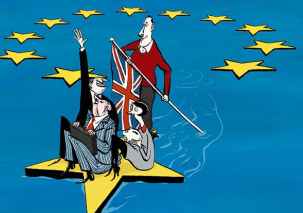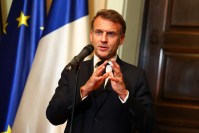The 109th edition of the Tour de France is underway although Friday’s first stage, held for the first time in Denmark, was spoiled by heavy rain and numerous crashes. Not that the adverse conditions dampened the spirits of the estimated half a million spectators who gathered in Copenhagen to witness a spot of sporting history.
Similar crowds will line the route of cycling’s most famous race when it arrives in France on Tuesday, all hoping to cheer on the first homegrown winner of the Tour since Bernard Hinault was crowned champion in 1985. In an interview in the Guardian in 2009 Hinault was blunt when asked why France was no longer able to produce a winner. ‘The French don’t train,’ he declared. ‘The only way to do it would be to block part of their salary and only let them have it if they win. Or hold a knife to their throats.’
Despite the lack of success the Tour remains the highlight of the sporting calendar in France and for the past week the print and broadcast media have been promoting the event. On Tuesday France 2, the equivalent of BBC1, broadcast a two hour documentary examining the sporting, political, historical and cultural significance of the Tour. It was Charles de Gaulle who was instrumental in popularising the Tour when he turned up unannounced to watch a stage of the 1960 race as it passed close to his home in Colombey-les-Deux-Églises. Hitherto, the race had been shunned by the intellectuals, who regarded it as a mindless sport fit only for the proles. ‘This caravan of 60 gaudy lorries singing the virtues of an apéritif, underpants or a dustbin is a shameful spectacle,’ commented the playwright Pierre Bost in 1935. ‘It stinks of vulgarity and money.’
De Gaulle’s benediction started a trend among presidents, however, and all his successors — bar Georges Pompidou — have used the Tour to try and boost their popularity among the people. Emmanuel Macron put in an appearance in the south-west city of Pau during the 2019 race, as much of the country still smouldered from the Yellow Vest protests. ‘It’s part of the French mythology,’ he explained. ‘We are a country which likes to follow those who attack, those who take risks, get to the top of the mountains and then attack even on the descent… it makes us dream of doing the impossible.’
The Tour is to the French what Wimbledon is to the English: an opportunity to wallow in nostalgia and tradition. Both project an image of the country that is anachronistic and self-indulgent, but immensely popular with overseas audiences. Last year the global television audience for the Tour was 42.4 million, a record, and what they saw was what they always see — the France of the tourist brochures: the Alps, the Pyrenees, Provence, the Massif Central, the chateaux and fields of sunflowers. The Tour steers clear of the more insalubrious inner-city suburbs.
Not everyone in France is a fan, and on the left there is a small but growing opposition to the Tour. In 2009 environmentalists complained (with good reason) about the plastic detritus left on Mont Ventoux after the Tour had swept through, and a decade later 34 MPs published an open letter in a Sunday newspaper on the eve of the race urging the organisers to do more to combat the waste as well as the pollution caused by the 2,300 support cars over the 2,000 odd miles of racing. The organisers responded by introducing hybrid cars in 2021 and also pledging to make the freebies’ distributed among the crowds prior to the start of each stage ‘eco-responsible’.
That hasn’t placated the more radical elements of the left, such as Nathalie Appéré, the mayor of Rennes, who declined to host the Tour in their city in 2021 because of what she regards as its sexism and environmental unfriendliness. Her criticism of the Tour as sexist, a reference to the tradition of two female hostesses kissing each stage winner on the podium, prompted organisers to replace one of the women with a man for the 2020 race. As for the kissing, Covid has put an end to that custom.
The more astute politicians, however, understand that one tinkers too much with the Tour at one’s peril. It is for the French a month of patriotism and escapism, one that coincides with the start of the summer holidays, and this year the desire to flee the daily grind for a few weeks is more pressing than ever.
France, like Britain, feels like it’s coming apart at the seams. Barely a week goes by without another politician accused of sexual misconduct, while hospitals are in crisis, airport workers strike and inflation continues to soar.
It hit 5.2 per cent in May, a level not seen in France since 1985, the same year they last saw a Tour winner. Prices are rising in shops and at petrol stations and last week Fabien Roussel, leader of the Communist party and a member of Jean-Luc Mélenchon’s NUPES coalition, warned of a ‘social explosion’ because the ‘French can no longer live properly’.
If French economists are right with their forecasts, inflation will reach 7 per cent in the autumn, the time of the year that traditionally hosts another great French tradition: that of the street protest. They remain as popular as the Tour de France, attracting in general the same demographic, although what one is unlikely to see among the crowds is a beaming president spouting platitudes about living the dream.







Comments